专业英语四级考试听力题方法
- 格式:doc
- 大小:30.00 KB
- 文档页数:9
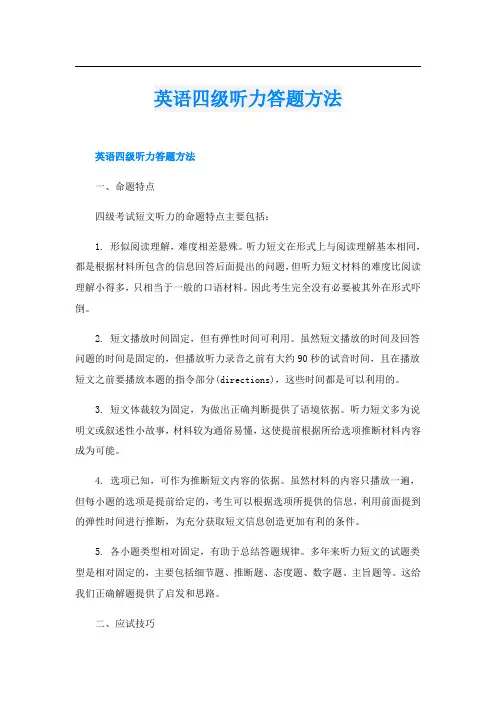
英语四级听力答题方法英语四级听力答题方法一、命题特点四级考试短文听力的命题特点主要包括:1. 形似阅读理解,难度相差悬殊。
听力短文在形式上与阅读理解基本相同,都是根据材料所包含的信息回答后面提出的问题,但听力短文材料的难度比阅读理解小得多,只相当于一般的口语材料。
因此考生完全没有必要被其外在形式吓倒。
2. 短文播放时间固定,但有弹性时间可利用。
虽然短文播放的时间及回答问题的时间是固定的,但播放听力录音之前有大约90秒的试音时间,且在播放短文之前要播放本题的指令部分(directions),这些时间都是可以利用的。
3. 短文体裁较为固定,为做出正确判断提供了语境依据。
听力短文多为说明文或叙述性小故事,材料较为通俗易懂,这使提前根据所给选项推断材料内容成为可能。
4. 选项已知,可作为推断短文内容的依据。
虽然材料的内容只播放一遍,但每小题的选项是提前给定的,考生可以根据选项所提供的信息,利用前面提到的弹性时间进行推断,为充分获取短文信息创造更加有利的条件。
5. 各小题类型相对固定,有助于总结答题规律。
多年来听力短文的试题类型是相对固定的,主要包括细节题、推断题、态度题、数字题、主旨题等。
这给我们正确解题提供了启发和思路。
二、应试技巧结合听力短文的命题特点,我们可总结出如下解题步骤:首先,浏览已知选项,推断问题的内容和短文大意。
在播放短文之前,我们可以利用弹性时间浏览各小题选项,推断短文的体裁和大致内容,为播放短文时充分获取信息做准备。
另外,也可据此推断问题的类型甚至内容以便听录音时更有针对性。
其次,手眼脑并用,记录关键信息。
播放短文录音期间要听记兼顾,以听为主。
一篇短文就是一个信息群,完全靠大脑记忆所有的信息往往是很困难的。
因此我们应该把获取的主要信息有选择性地记录下来,特别是有关细节,为做出正确选择做准备。
需要特别注意的是这时"听"应该是第一位的,千万不要因为记录前面的信息而漏听后面的信息。
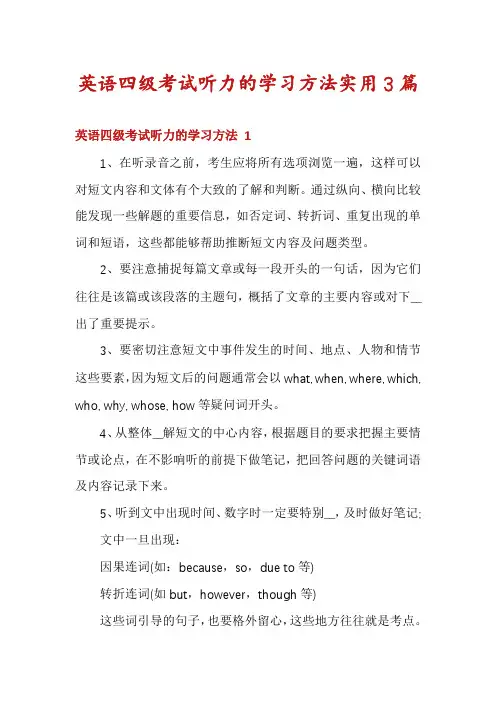
英语四级考试听力的学习方法实用3篇英语四级考试听力的学习方法 11、在听录音之前,考生应将所有选项浏览一遍,这样可以对短文内容和文体有个大致的了解和判断。
通过纵向、横向比较能发现一些解题的重要信息,如否定词、转折词、重复出现的单词和短语,这些都能够帮助推断短文内容及问题类型。
2、要注意捕捉每篇文章或每一段开头的一句话,因为它们往往是该篇或该段落的主题句,概括了文章的主要内容或对下__出了重要提示。
3、要密切注意短文中事件发生的时间、地点、人物和情节这些要素,因为短文后的问题通常会以what, when, where, which, who, why, whose, how等疑问词开头。
4、从整体__解短文的中心内容,根据题目的要求把握主要情节或论点,在不影响听的前提下做笔记,把回答问题的关键词语及内容记录下来。
5、听到文中出现时间、数字时一定要特别__,及时做好笔记;文中一旦出现:因果连词(如:because,so,due to等)转折连词(如but,however,though等)这些词引导的句子,也要格外留心,这些地方往往就是考点。
6、要特别注意试题的排列次序,因为这类题型常常是将小题按所对应的录音材料内容的顺序排列。
如果没有时间预先阅读选项或时间不宽裕,考生可以边听录音边依次浏览选项,同时进行思考、答题。
英语四级考试听力的学习方法 21、调整心理状态在开首,同学们在练习听力以及正式的考试中都必须遵循的一条,就是放松心情,但要使听觉系统紧张起来。
只有放松心情,才能正常(甚至超水平)发挥听力。
听的过程中,一定要集中__,不要胡思乱想。
同学们在平时训练中,就要注意加强大脑与听觉系统之间的协调与沟通。
2、注意辨别近音比如:W: I've got to buy a new car.M: Really?Q: What does the woman mean?选项:A) She purchased a car recently.B) She knew the car was in the lot.C) She always forgets to clean her car.D) She really needs a new car.可以看出,B)项中的knew是对原文中new的近音干扰,C)项中的forget是对have got to的近音干扰。
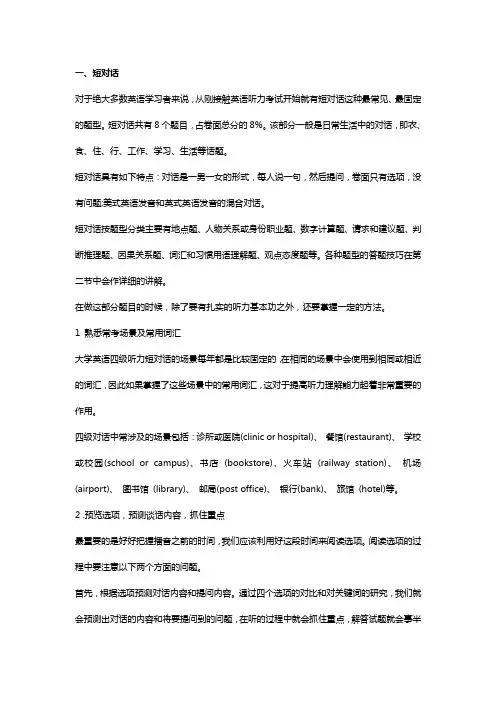
一、短对话对于绝大多数英语学习者来说,从刚接触英语听力考试开始就有短对话这种最常见、最固定的题型。
短对话共有8个题目,占卷面总分的8%。
该部分一般是日常生活中的对话,即衣、食、住、行、工作、学习、生活等话题。
短对话具有如下特点:对话是一男一女的形式,每人说一句,然后提问,卷面只有选项,没有问题;美式英语发音和英式英语发音的混合对话。
短对话按题型分类主要有地点题、人物关系或身份职业题、数字计算题、请求和建议题、判断推理题、因果关系题、词汇和习惯用语理解题、观点态度题等。
各种题型的答题技巧在第二节中会作详细的讲解。
在做这部分题目的时候,除了要有扎实的听力基本功之外,还要掌握一定的方法。
1 熟悉常考场景及常用词汇大学英语四级听力短对话的场景每年都是比较固定的,在相同的场景中会使用到相同或相近的词汇,因此如果掌握了这些场景中的常用词汇,这对于提高听力理解能力起着非常重要的作用。
四级对话中常涉及的场景包括:诊所或医院(clinic or hospital)、餐馆(restaurant)、学校或校园(school or campus)、书店(bookstore)、火车站(railway station)、机场(airport)、图书馆(library)、邮局(post office)、银行(bank)、旅馆(hotel)等。
2 .预览选项,预测谈话内容,抓住重点最重要的是好好把握播音之前的时间,我们应该利用好这段时间来阅读选项。
阅读选项的过程中要注意以下两个方面的问题。
首先,根据选项预测对话内容和提问内容。
通过四个选项的对比和对关键词的研究,我们就会预测出对话的内容和将要提问到的问题,在听的过程中就会抓住重点,解答试题就会事半功倍。
【典型例题】(2006年6月)12. A) The woman does her own housework.B) The woman needs a housekeeper.C) The woman’s house is in a mess.D) The woman works as a housekeeper.显而易见,此题是有关housework的问题,因为四个选项中分别出现了does housework, needs housekeeper, house mess, work as housekeeper;由此推断此题是关于做家务方面的一个谈话,在听这则对话时,就可以轻而易举地对号入座了。
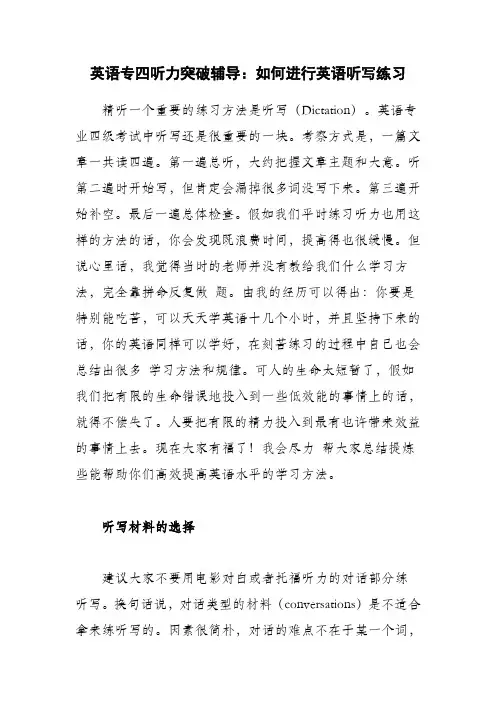
英语专四听力突破辅导:如何进行英语听写练习精听一个重要的练习方法是听写(Dictation)。
英语专业四级考试中听写还是很重要的一块。
考察方式是,一篇文章一共读四遍。
第一遍总听,大约把握文章主题和大意。
听第二遍时开始写,但肯定会漏掉很多词没写下来。
第三遍开始补空。
最后一遍总体检查。
假如我们平时练习听力也用这样的方法的话,你会发现既浪费时间,提高得也很缓慢。
但说心里话,我觉得当时的老师并没有教给我们什么学习方法,完全靠拼命反复做题。
由我的经历可以得出:你要是特别能吃苦,可以天天学英语十几个小时,并且坚持下来的话,你的英语同样可以学好,在刻苦练习的过程中自己也会总结出很多学习方法和规律。
可人的生命太短暂了,假如我们把有限的生命错误地投入到一些低效能的事情上的话,就得不偿失了。
人要把有限的精力投入到最有也许带来效益的事情上去。
现在大家有福了!我会尽力帮大家总结提炼些能帮助你们高效提高英语水平的学习方法。
听写材料的选择建议大家不要用电影对白或者托福听力的对话部分练听写。
换句话说,对话类型的材料(conversations)是不适合拿来练听写的。
因素很简朴,对话的难点不在于某一个词,或一个复杂的句型,或比较晦涩的内容,或巨大的信息量。
难点往往来自于一些音变现象,比如连读失去爆破;来自于一些俚语习惯表达;来自于上下文语境的理解。
换句话说,很多对话材料,就算原文里每个单词你都结识,但不一定理解这句话的意思。
所以,费了半天劲听写下来的对话内容,要么看不懂不理解;要么就是这次看懂了,下次还是听不出。
所以,对话材料应当采用的练习方法其实是跟读模仿。
后面会讲到。
用来练听写的材料应当是一个人的陈述、讲座之类的(Lecture)。
之所以选择这样的材料,是和练听写的目地分不开的。
练听写的核心本质其实是为了提高我们快速理解和记忆的能力。
有的同学误认为听写就是要把听到的所有内容都写下来,那是一些考试的规定,不是我们平时提高听力的方法。
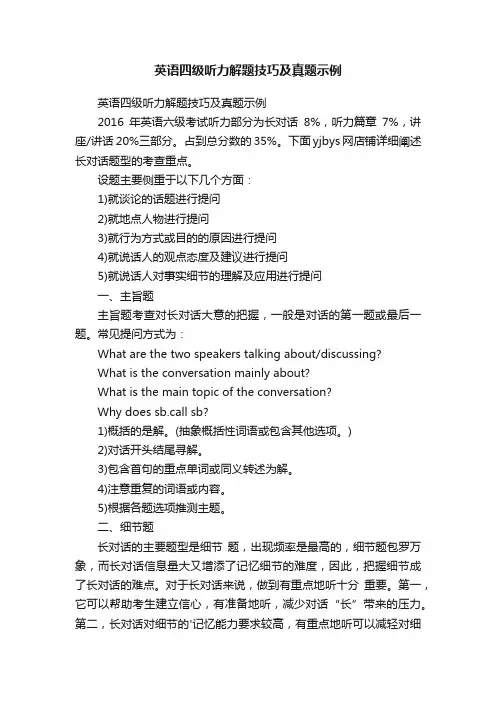
英语四级听力解题技巧及真题示例英语四级听力解题技巧及真题示例2016年英语六级考试听力部分为长对话8%,听力篇章7%,讲座/讲话20%三部分。
占到总分数的35%。
下面yjbys网店铺详细阐述长对话题型的考查重点。
设题主要侧重于以下几个方面:1)就谈论的话题进行提问2)就地点人物进行提问3)就行为方式或目的的原因进行提问4)就说话人的观点态度及建议进行提问5)就说话人对事实细节的理解及应用进行提问一、主旨题主旨题考查对长对话大意的把握,一般是对话的第一题或最后一题。
常见提问方式为:What are the two speakers talking about/discussing?What is the conversation mainly about?What is the main topic of the conversation?Why does sb.call sb?1)概括的是解。
(抽象概括性词语或包含其他选项。
)2)对话开头结尾寻解。
3)包含首句的重点单词或同义转述为解。
4)注意重复的词语或内容。
5)根据各题选项推测主题。
二、细节题长对话的主要题型是细节题,出现频率是最高的,细节题包罗万象,而长对话信息量大又增添了记忆细节的难度,因此,把握细节成了长对话的难点。
对于长对话来说,做到有重点地听十分重要。
第一,它可以帮助考生建立信心,有准备地听,减少对话“长”带来的压力。
第二,长对话对细节的'记忆能力要求较高,有重点地听可以减轻对细节进行记忆的压力。
为了帮助集中注意力,尽量最准确地获得细节信息,避免听懂了没记住的可能,考生应该在听的过程中做记录。
1)注意问答处,关注回答者。
2)注意与主题相关的细节。
三、推断题推断题考查考生在听懂对话内容的基础上,根据对话的内含、关键词、上下文、语气等,利用逻辑推理、判断、归纳去领会说话人的真实含义的能力。
常见提问方式为:What does the man mean/suggest?What does the woman imply?What can be inferred/concluded from the conversation?What do we learn from the conversation?ο1)听到的往往不是解。
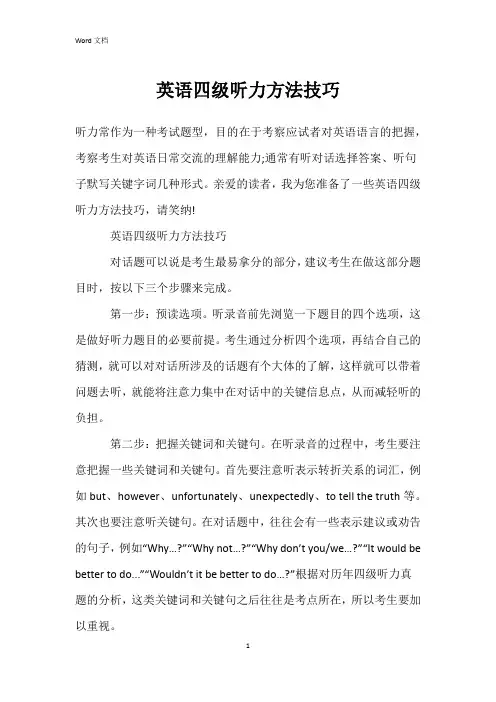
英语四级听力方法技巧听力常作为一种考试题型,目的在于考察应试者对英语语言的把握,考察考生对英语日常交流的理解能力;通常有听对话选择答案、听句子默写关键字词几种形式。
亲爱的读者,我为您准备了一些英语四级听力方法技巧,请笑纳!英语四级听力方法技巧对话题可以说是考生最易拿分的部分,建议考生在做这部分题目时,按以下三个步骤来完成。
第一步:预读选项。
听录音前先浏览一下题目的四个选项,这是做好听力题目的必要前提。
考生通过分析四个选项,再结合自己的猜测,就可以对对话所涉及的话题有个大体的了解,这样就可以带着问题去听,就能将注意力集中在对话中的关键信息点,从而减轻听的负担。
第二步:把握关键词和关键句。
在听录音的过程中,考生要注意把握一些关键词和关键句。
首先要注意听表示转折关系的词汇,例如but、however、unfortunately、unexpectedly、to tell the truth等。
其次也要注意听关键句。
在对话题中,往往会有一些表示建议或劝告的句子,例如“Why…?”“Why not…?”“Why don’t you/we…?”“It would be better to do...”“Wouldn’t it be better to do…?”根据对历年四级听力真题的分析,这类关键词和关键句之后往往是考点所在,所以考生要加以重视。
第三步:判断相关场景。
考生要学会通过捕捉听力题目和听力录音中出现的关键词来判断相关场景。
四级听力常考的场景有:学习场景、工作场景、天气场景、医院场景、租房场景、娱乐场景、餐馆场景、选课场景等。
判断出相关的场景有利于考生在解题时有据可依,提高解题正确率。
在这里笔者也提醒考生,由于英语是一种模式化的语言,在固定的场景中,其词汇和表达也相对比较固定,所以考生应在平时注意多积累一些场景中的高频词汇和习惯表达,以提高听力理解能力。
英语四级听力复习计划凡事预则立不预则废,如果有了一个合理而可行的计划,并能认真执行,那么我们离成功又进了一步。
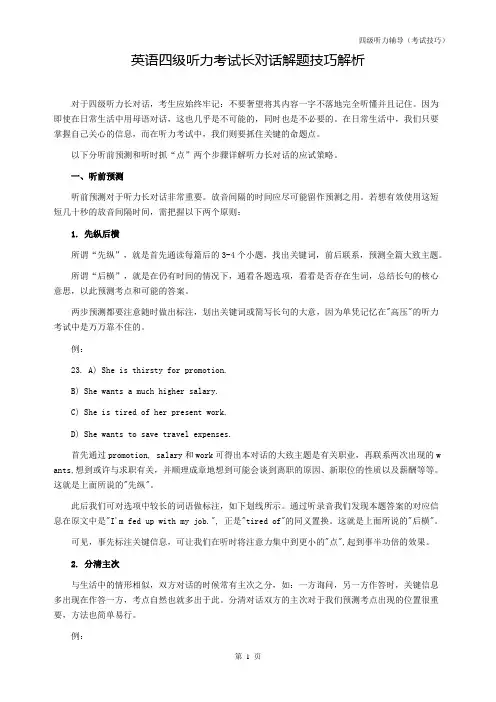
英语四级听力考试长对话解题技巧解析对于四级听力长对话,考生应始终牢记:不要奢望将其内容一字不落地完全听懂并且记住。
因为即使在日常生活中用母语对话,这也几乎是不可能的,同时也是不必要的。
在日常生活中,我们只要掌握自己关心的信息,而在听力考试中,我们则要抓住关键的命题点。
以下分听前预测和听时抓“点”两个步骤详解听力长对话的应试策略。
一、听前预测听前预测对于听力长对话非常重要。
放音间隔的时间应尽可能留作预测之用。
若想有效使用这短短几十秒的放音间隔时间,需把握以下两个原则:1. 先纵后横所谓“先纵”,就是首先通读每篇后的3-4个小题,找出关键词,前后联系,预测全篇大致主题。
所谓“后横”,就是在仍有时间的情况下,通看各题选项,看看是否存在生词,总结长句的核心意思,以此预测考点和可能的答案。
两步预测都要注意随时做出标注,划出关键词或简写长句的大意,因为单凭记忆在"高压"的听力考试中是万万靠不住的。
例:23. A) She is thirsty for promotion.B) She wants a much higher salary.C) She is tired of her present work.D) She wants to save travel expenses.首先通过promotion, salary和work可得出本对话的大致主题是有关职业,再联系两次出现的w ants,想到或许与求职有关,并顺理成章地想到可能会谈到离职的原因、新职位的性质以及薪酬等等。
这就是上面所说的"先纵"。
此后我们可对选项中较长的词语做标注,如下划线所示。
通过听录音我们发现本题答案的对应信息在原文中是"I'm fed up with my job.", 正是"tired of"的同义置换。
这就是上面所说的"后横"。
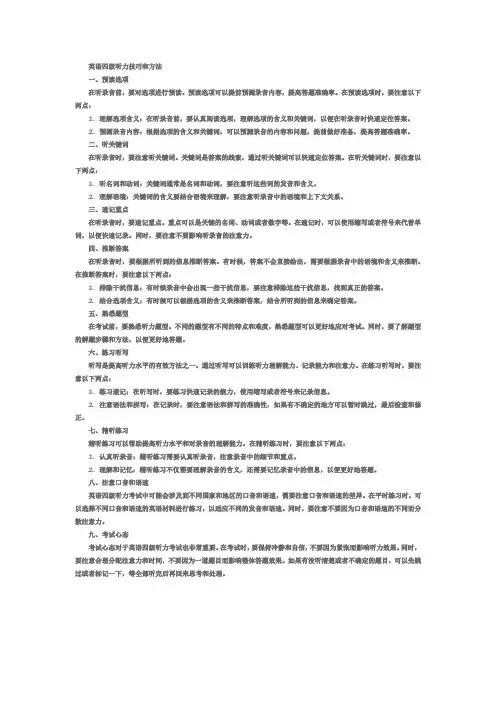
英语四级听力技巧和方法一、预读选项在听录音前,要对选项进行预读。
预读选项可以提前预测录音内容,提高答题准确率。
在预读选项时,要注意以下两点:1. 理解选项含义:在听录音前,要认真阅读选项,理解选项的含义和关键词,以便在听录音时快速定位答案。
2. 预测录音内容:根据选项的含义和关键词,可以预测录音的内容和问题,提前做好准备,提高答题准确率。
二、听关键词在听录音时,要注意听关键词。
关键词是答案的线索,通过听关键词可以快速定位答案。
在听关键词时,要注意以下两点:1. 听名词和动词:关键词通常是名词和动词,要注意听这些词的发音和含义。
2. 理解语境:关键词的含义要结合语境来理解,要注意听录音中的语境和上下文关系。
三、速记重点在听录音时,要速记重点。
重点可以是关键的名词、动词或者数字等。
在速记时,可以使用缩写或者符号来代替单词,以便快速记录。
同时,要注意不要影响听录音的注意力。
四、推断答案在听录音时,要根据所听到的信息推断答案。
有时候,答案不会直接给出,需要根据录音中的语境和含义来推断。
在推断答案时,要注意以下两点:1. 排除干扰信息:有时候录音中会出现一些干扰信息,要注意排除这些干扰信息,找到真正的答案。
2. 结合选项含义:有时候可以根据选项的含义来推断答案,结合所听到的信息来确定答案。
五、熟悉题型在考试前,要熟悉听力题型。
不同的题型有不同的特点和难度,熟悉题型可以更好地应对考试。
同时,要了解题型的解题步骤和方法,以便更好地答题。
六、练习听写听写是提高听力水平的有效方法之一。
通过听写可以训练听力理解能力、记录能力和注意力。
在练习听写时,要注意以下两点:1. 练习速记:在听写时,要练习快速记录的能力,使用缩写或者符号来记录信息。
2. 注意语法和拼写:在记录时,要注意语法和拼写的准确性,如果有不确定的地方可以暂时跳过,最后检查和修正。
七、精听练习精听练习可以帮助提高听力水平和对录音的理解能力。
在精听练习时,要注意以下两点:1. 认真听录音:精听练习需要认真听录音,注意录音中的细节和重点。
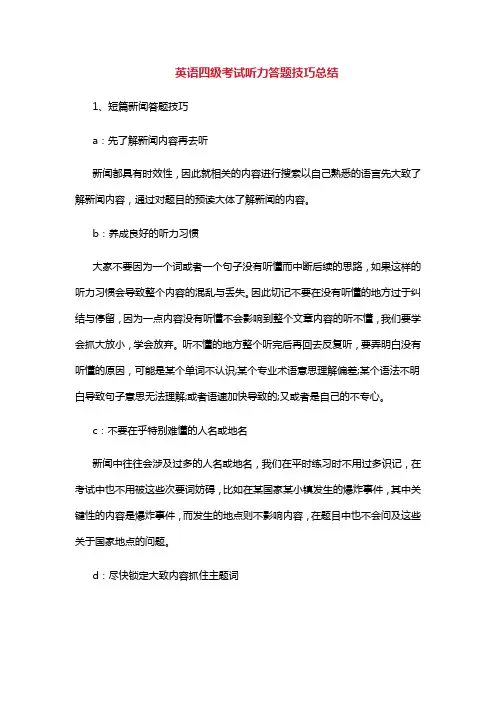
英语四级考试听力答题技巧总结1、短篇新闻答题技巧a:先了解新闻内容再去听新闻都具有时效性,因此就相关的内容进行搜索以自己熟悉的语言先大致了解新闻内容,通过对题目的预读大体了解新闻的内容。
b:养成良好的听力习惯大家不要因为一个词或者一个句子没有听懂而中断后续的思路,如果这样的听力习惯会导致整个内容的混乱与丢失。
因此切记不要在没有听懂的地方过于纠结与停留,因为一点内容没有听懂不会影响到整个文章内容的听不懂,我们要学会抓大放小,学会放弃。
听不懂的地方整个听完后再回去反复听,要弄明白没有听懂的原因,可能是某个单词不认识;某个专业术语意思理解偏差;某个语法不明白导致句子意思无法理解;或者语速加快导致的;又或者是自己的不专心。
c:不要在乎特别难懂的人名或地名新闻中往往会涉及过多的人名或地名,我们在平时练习时不用过多识记,在考试中也不用被这些次要词妨碍,比如在某国家某小镇发生的爆炸事件,其中关键性的内容是爆炸事件,而发生的地点则不影响内容,在题目中也不会问及这些关于国家地点的问题。
d:尽快锁定大致内容抓住主题词新闻的主旨往往在首句处,因此前边内容要认真听清楚,往往一句话概括出内容,后边都是细节介绍。
所以要尽快地抓住文章主旨。
主旨句往往含有内容关键词,比如bus explosion/US election race等等。
当然也会有Now in sp orts(现在进入体育新闻)....../Turn to the Middle East(现在转向中东地区)......等简单的呈现方式。
2、长对话的答题技巧两个长对话,长对话的答案一般也是从上面短对话的几个方面去考虑得出答案。
要注意的是,有时候同一个长对话里的不同问题,答案可能从不同的方面得出。
做这部分试题的时候,要注意以下几点:听音前,预读选项尽可能地把3或者4道试题的选项浏览一遍,根据选项猜测可能出现的问题及提问方式。
听音时,迅速抓住与选项及所猜测问题有关的关键词,速记有关内容或者在选项后面做记号,在有可能成为答案的选项后面做记号,在绝对没有可能成为答案的选项后面做记号,当然两种记号肯定应该不一样。
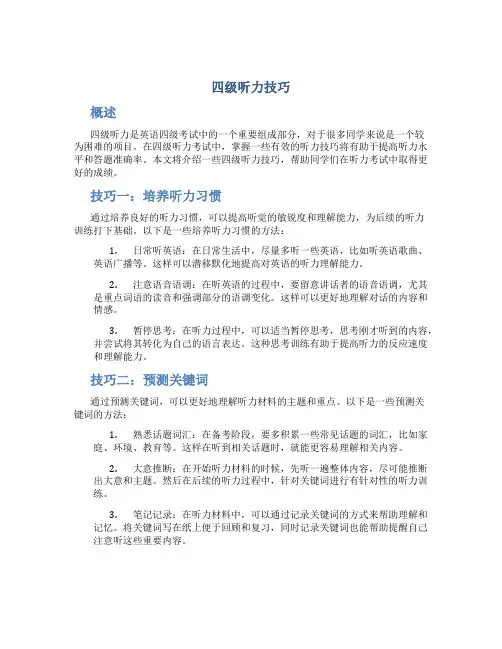
四级听力技巧概述四级听力是英语四级考试中的一个重要组成部分,对于很多同学来说是一个较为困难的项目。
在四级听力考试中,掌握一些有效的听力技巧将有助于提高听力水平和答题准确率。
本文将介绍一些四级听力技巧,帮助同学们在听力考试中取得更好的成绩。
技巧一:培养听力习惯通过培养良好的听力习惯,可以提高听觉的敏锐度和理解能力,为后续的听力训练打下基础。
以下是一些培养听力习惯的方法:1.日常听英语:在日常生活中,尽量多听一些英语,比如听英语歌曲、英语广播等。
这样可以潜移默化地提高对英语的听力理解能力。
2.注意语音语调:在听英语的过程中,要留意讲话者的语音语调,尤其是重点词语的读音和强调部分的语调变化。
这样可以更好地理解对话的内容和情感。
3.暂停思考:在听力过程中,可以适当暂停思考,思考刚才听到的内容,并尝试将其转化为自己的语言表达。
这种思考训练有助于提高听力的反应速度和理解能力。
技巧二:预测关键词通过预测关键词,可以更好地理解听力材料的主题和重点。
以下是一些预测关键词的方法:1.熟悉话题词汇:在备考阶段,要多积累一些常见话题的词汇,比如家庭、环境、教育等。
这样在听到相关话题时,就能更容易理解相关内容。
2.大意推断:在开始听力材料的时候,先听一遍整体内容,尽可能推断出大意和主题。
然后在后续的听力过程中,针对关键词进行有针对性的听力训练。
3.笔记记录:在听力材料中,可以通过记录关键词的方式来帮助理解和记忆。
将关键词写在纸上便于回顾和复习,同时记录关键词也能帮助提醒自己注意听这些重要内容。
技巧三:注意细节在四级听力考试中,细节问题往往是难点之一。
以下是一些注意细节的方法:1.倾听数字和时间:在听力材料中,数字和时间往往是重要的细节信息。
需要注意听清楚并正确记下这些数字和时间,以免错失答题关键。
2.辨别特殊信息词:在听力材料中,有时会出现表示特殊信息的词汇,比如特定的名称、专业术语等。
需要通过耳朵训练和词汇积累来提高对这些词汇的辨别和理解能力。
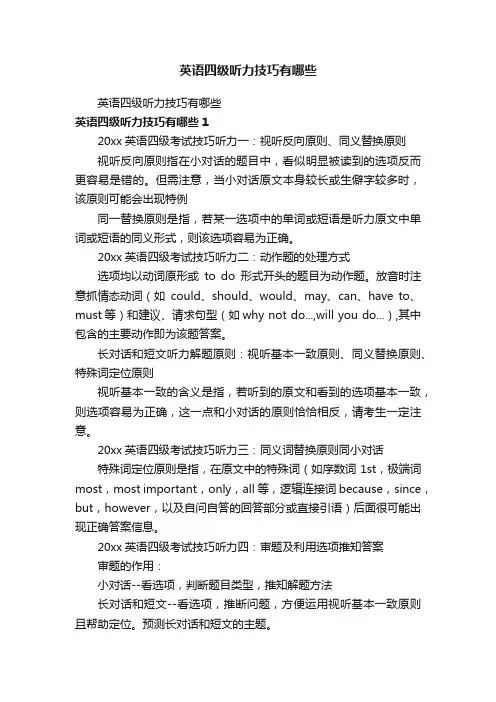
英语四级听力技巧有哪些英语四级听力技巧有哪些英语四级听力技巧有哪些120xx英语四级考试技巧听力一:视听反向原则、同义替换原则视听反向原则指在小对话的题目中,看似明显被读到的选项反而更容易是错的。
但需注意,当小对话原文本身较长或生僻字较多时,该原则可能会出现特例同一替换原则是指,若某一选项中的单词或短语是听力原文中单词或短语的同义形式,则该选项容易为正确。
20xx英语四级考试技巧听力二:动作题的处理方式选项均以动词原形或to do形式开头的题目为动作题。
放音时注意抓情态动词(如could、should、would、may、can、have to、must等)和建议、请求句型(如why not do...,will you do...),其中包含的主要动作即为该题答案。
长对话和短文听力解题原则:视听基本一致原则、同义替换原则、特殊词定位原则视听基本一致的含义是指,若听到的原文和看到的选项基本一致,则选项容易为正确,这一点和小对话的原则恰恰相反,请考生一定注意。
20xx英语四级考试技巧听力三:同义词替换原则同小对话特殊词定位原则是指,在原文中的特殊词(如序数词1st,极端词most,most important,only,all等,逻辑连接词because,since,but,however,以及自问自答的回答部分或直接引语)后面很可能出现正确答案信息。
20xx英语四级考试技巧听力四:审题及利用选项推知答案审题的作用:小对话--看选项,判断题目类型,推知解题方法长对话和短文--看选项,推断问题,方便运用视听基本一致原则且帮助定位。
预测长对话和短文的主题。
20xx英语四级考试技巧听力五:如何在完全听不懂的情况下通过选项推知答案:一般地,当两个选项意思相近或谈论的话题相同时,其中一个可能是正确答案;当两个选项通过同义转换使得实际观点相同时,两个选项均不是答案;当两个选项话题相同且意思相反时,其中一个可能是正确答案。
英语四级听力方法技巧
四级听力考试是英语四级考试的一部分,是考察考生对英语听力的理解能力。
以下是一些建议和技巧,帮助你提高英语四级听力能力:
1. 多听真实材料:选取一些实际生活中的英语听力材料,如英语电视剧、电影、播客等,以模拟真实听力环境。
2. 提前阅读题目:在播放录音之前,先浏览一遍听力材料的题目,了解大致内容和所需回答的问题。
3. 练习听力速度:找一些速度稍快的英语听力材料进行训练,以提高对快速英语语速的听力理解能力。
4. 增加词汇量:扩大词汇量是提高听力能力的关键。
通过大量阅读、背诵、记忆生词来增加词汇量。
5. 练习笔记和摘要技巧:在听力过程中,注意记录关键词和信息,以帮助理解和回答问题。
6. 关注语境线索:注意语音、语调和上下文线索,从而推断出词汇的含义和句子的逻辑关系。
7. 练习听不懂的部分:如果在听力过程中遇到难以理解的部分,不要停下来纠结,继续倾听。
如果有必要,可以在录音结束后回头解决这一部分。
8. 增加听力时间:每天尽量多花时间倾听英语材料,提高听力的熟练度和效果。
9. 制定具体目标:为自己设定明确的听力目标,如每天听一个小时的英语材料,并逐渐增加难度。
10. 频繁练习模拟题:多做一些听力模拟题,熟悉题型和考试要求,提高答题速度和准确度。
记住,提高英语听力需要持续的努力和练习。
坚持练习,掌握一些有效的技巧,你的听力能力会逐渐提高。
英语四级考试听力考试九大技巧在英语四级考试中,听力部分一直是许多考生感到棘手的环节。
然而,只要掌握了正确的技巧和方法,提高听力成绩并非难事。
下面为大家介绍英语四级考试听力考试的九大技巧。
技巧一:提前预读选项在听力考试开始之前,会有一段短暂的时间用于预读选项。
这段时间非常宝贵,要充分利用起来。
快速浏览选项内容,了解题目主题和关键信息,对即将听到的内容有一个大致的预判。
例如,如果选项中出现了不同的地点、时间、人物等,那么在听的过程中就要特别注意相关信息。
技巧二:抓住关键词在听力过程中,不必试图听懂每一个单词,而是要抓住关键词。
这些关键词往往能够揭示句子的主要内容和重点信息。
通常,名词、动词、形容词等实词更有可能是关键词。
比如,听到“bookstore”“buy”“expensive”等词,就能大致推测出是在谈论购买书籍以及价格的相关话题。
技巧三:注意转折词转折词后的内容往往是重点。
常见的转折词有“but”“however”“yet”“though”等。
当听到这些词时,要集中注意力,因为其后的信息可能会改变前面的意思,或者是出题的关键所在。
比如,“I thought the movie was great, but the ending was disappointing” 重点就在“but”后面关于电影结局令人失望的描述。
技巧四:熟悉各类场景词汇英语四级听力考试的场景较为固定,如校园生活、工作职场、旅游出行等。
熟悉这些场景中常见的词汇和表达方式,有助于更快地理解听力内容。
比如,在校园场景中,可能会听到“semester”“professor”“assignment”等词;在旅游场景中,“destination”“sightseeing”“package tour”等词出现的频率较高。
技巧五:培养短期记忆能力由于听力内容只播放一遍,所以培养短期记忆能力很重要。
在听的过程中,可以尝试记住关键信息的大致内容,以便在回答问题时能够回忆起来。
英语专业四级听力听写技巧在英语专业四级考试中,听力部分通常是考生们较为头疼的一部分。
由于听力训练的缺失、听力材料的快速播放等原因,许多考生常常无法完整准确地听写出听力材料的内容。
但只要我们能够掌握一些听力听写的技巧,相信我们的听写能力会有所提高。
下面将介绍几个有效的技巧,希望对大家备考有所帮助。
一、全神贯注考试时,首先我们需要全神贯注地听录音内容。
专注地听录音可以帮助我们更好地理解和掌握内容,减少错误听写的可能性。
所以,不要分心或者走神,要全神贯注地准确抓住每一个细节。
二、抓关键词汇在听力材料中,有些词汇是关键词,它们通常具有很强的指示性,能够帮助我们理解整个句子的含义。
因此,在听写时,要重点抓住关键词汇,包括人名、地名、日期、数字、专业术语等,以保证句子的准确性。
三、掌握常用短语和表达英语听力中有许多常用短语和表达,对于我们的听写能力有很大的帮助。
为了提升听写的准确度,我们需要多积累一些常用短语和表达,比如“as a matter of fact”(事实上)、“take into consideration”(考虑到)等,这些短语和表达在听写时能够提供一些线索,帮助我们更好地理解句子意思。
四、注意连读和弱读英语中的连读和弱读是一个很重要的语音现象,也经常出现在听力材料中。
连读是指在两个单词之间发生连读的现象,而弱读是指在句子中某些词汇发音不够明显的现象。
理解和掌握连读和弱读现象能够帮助我们更加准确地听写出句子的内容。
五、练习速记技巧速记技巧对于听写能力的提升也是非常重要的。
在考试时,时间是非常紧张的,因此我们需要善于使用速记技巧快速记录内容。
比如,可以采用简化的图标或符号代替某个单词,或者使用首字母缩写等。
这些技巧能够帮助我们在有限时间内把所听到的内容快速准确地记录下来。
六、反复练习提高听力听写技巧最有效的方法就是不断地反复练习。
在备考过程中,我们可以找一些相关的听力材料进行听写,不仅可以加深对听力材料的理解,还能够提升自己的听写能力。
英语四级听力十大答题技巧1、千万不要边听边涂卡,这会导致你没有时间看下一题。
最佳方案是利用每段题目开头的direction的时间进行涂卡;2、大部分人容易纠结听不懂的东西,但是听力的答案往往存在于最简单的语句中。
比如,短对话的第二句,听懂yes和no, 要比拼了老命听懂后面莫名其妙的话有用多了;3、短对话已经成为听力选择题中最变幻莫测的题目了。
大部分情况下,答案都在第二句。
实在听不懂时,使用“视听反向”即听到的不选的方式来排除答案。
但是,记住,短对话务必听问题;4、长对话和短文听力的第一题答案,一般都在前三句就出现,所以,我们比谁反应更快,不比谁更聪明;5、视听一致即听到什么选什么,是长对话及短文听力的最佳做题方式。
裸考的渣渣们,这个方法是你们逆袭听力的唯一机会;6、当然,你可能会发现,有的题目中,几个选项都被读到了,别哭,冷静一下,看看哪个选项被读到的最多即可;7、除了渣渣们都知道的but, however之外,first, in fact, 最高级,比较级,情态动词后方,也容易出现答案;8、听写是听力中唯一一种听懂和听不懂,都不影响得分的题目。
当然,如果答案听不懂,另当别论;9、最后一周内,多背些听力选项中的词语的拼写,这类词语在听写中被考到的几率极高;10、虽然你真的没法淡定了,但是我还是要提醒你,听力和阅读写作翻译不同,材料是流动的,播放了便不再重现。
所以,保持克制与冷静,一定会让你发挥的更好。
关于英语四级听力考试的准备:1、考试时间不要觉得人人都知道,每年都有人忘记时间,迟到等等,本来就准备不充分,迟到一紧张会更加剧你想放弃的心情,再渣也要把我好这一次,牢记时间,提前15分钟到考场。
6月14日上午 09:00—11:25 四级考试6月14日下午15:00—17:25 六级考试2、考场路线最好提前一天现场勘查,即使懒得去,那也一定要搞清楚路线,哪栋楼,哪个教室,大概要花多长时间走到,不要觉得可能是学校天天都走熟的不能再熟,万一当天施工、这那啥的,考前稍微上点心就能避免的,没必要因为小事闹心影响本来就不怎么样的考试心情。
英语四级考试各类题型的答题技巧近年来,英语四级考试在大学英语教学中发挥着重要的作用。
四级考试涵盖了多种题型,考察的语言技能也较为全面。
为了帮助广大考生更好地应对各类题型,本文将介绍几种常见题型的答题技巧,并提供一些实用的学习方法。
一、听力题1. 听做笔记听力题通常是以对话或短文形式呈现,考生可以在听力开始前借助准备时间阅读题目,然后有针对性地做笔记。
在听力过程中,要注意记录关键信息,如人物姓名、地点、时间等,以帮助理解和回答问题。
2. 预测选项在听力的问题选项中,往往有一些是可以预测的,例如数字、时间等。
考生要善于根据语境推测,可以在听力过程中对可能的答案进行判断,提高答题的准确性。
二、阅读理解题1. 略读全文在阅读理解题开始前,首先略读全文,了解文章的主题、结构和大意。
这样可以帮助考生对文章的信息有一个整体的把握,也有助于更快地找到答案。
2. 找关键词在具体阅读问题时,要注意寻找关键词。
通常问题中会提到某个细节,通过在文章中找到与之相关的关键词,可以有效缩小答案的范围。
三、完形填空题1. 预测上下文关系完形填空题要求考生根据上下文填写合适的单词或短语。
在做题前,可以先试着预测空格周围的上下文关系,从而猜测出适合的选项。
2. 强调句子逻辑阅读完整个短文后,注意整个句子之间的逻辑关系。
有时候,一些看似对的选项会破坏整个句子的逻辑结构,因此要注意选项与上下文的一致性。
四、写作题1. 明确写作目的写作题要求考生根据所给材料或题目要求,完成一篇短文写作。
在写作过程中,要明确写作目的,合理组织文章结构,并通过适当的连接词使文章内容更加紧凑。
2. 多练习写作写作题的得分在于能否恰当地表达自己的观点和想法。
考生可以多进行写作练习,积累一些常用的句型和词汇,同时也要注意提高写作的语法和拼写准确性。
综上所述,英语四级考试各类型题型都有一些应对技巧。
通过对不同题型的了解和灵活运用,考生可以提高应试能力,更好地完成考试任务。
专业四级考试听力题型的应对方法Part II 听写听写,顾名思义,既听又写,它渗透在各种形式的语言活动中,是最常用到的基本功之一。
听写测试要求考生把听到的内容准确无误地以笔头的形式表达出来,虽无需考生自己遣词造句,但由于牵涉到语言(听力﹑单词拼写﹑篇章结构等)与非语言能力(如记忆力﹑速记等)也决非易事。
从90年开始第一次TEM4测试,听写就作为一项测试项目,占有10 分, 比重为10%, 91 ,92年,93年上升到15 分, 比重为10%,从94年起(由于难度问题,本次取消了proof reading), 听写尽管仍为15 分, 但比重上升为15%,其间制定的新的考试大纲,正式明确了这一点。
从教纲到考纲,听写都是一项不可或缺的部分,且所占比重上升,与写作相同。
在TEM4中,考虑到基础阶段的特点及信度要求,采用的是录音式标准听写,根据考纲,长度为150字(word)左右,为一段或多段,答题纸上印有题目便于联想,所选题材广泛而不生僻,体裁多样,可以为叙述性、描写性、说明性,难度适中。
全文共分15个意群(chunk),每个意群可能是词组、分句或句子。
共念四遍,第一遍为正常速度朗读(wpm=120词),考生在此时要从整体理解全文内容,抓住中心大意,而不要着急写。
第二、三遍为慢读,根据意群停顿,分句或长句之间停10-15秒,考生此时要准确,逐字逐句迅速写下听到的内容。
第四遍又是正常语速(wpm=120词), 便于考生校对,四遍全部听写结束后,留有2分钟作为复查时间。
考生利用此时可检查全文是否有单词遗漏,拼写是否有误,标点符号是否选择正确,直到录音中听到“That is the end of dictation”,便可进行下一项听力内容了。
根据调查,听写中的几个明显错误是:1. 考生对这种标准听写形式陌生, 对听写材料进行改写甚至加工成作文;2. 第一遍听音时不知如何把握全文的大意(top-down approach), 而是着急写,丢了西瓜捡芝麻(bottom-up),只见部分单词而缺少骨架结构;3. 同样,在第四遍结束后的两分钟复查时间里,不会很好地利用分析逻辑能力对有些明显的或介词搭配或词语进行校正,小错不断,或丢词,或写出的内容前后不通顺;4. 由于朗读中没有念出标点,而是靠学生自己听,判断选择,于是就出现全文没有标点符号,没有大小写,或所有的停顿处都是一种符号,或中文标点混用在英文短文里的情况。
针对听写的考试现状,考生如何提高听写成绩呢?1. 考前要充分了解听写的形式,最好进行一次模拟实践,体会全过程。
2.根据朗读方式,选用相应的书写技巧。
如在听第一遍时,重点听主题思想、重点词,掌握全局概念,不要一听录音提笔就写,也许能写出前边的单词或句子,却有可能不知全文的大意;听第二遍和第三遍是以句子为单位重复的,在第二遍朗读录音时,要以意群为单位去理解,因时间关系,不可能一字一字地全部写下,所以要分清主次信息,抓句型和关键词(主语、谓语等),在听第三遍时,再把其它如修饰语、定冠词等遗漏内容补上,若有些词还来不及写,可用一些自己认识的缩略形式,甚至符号先代替,等最后一遍或复查两分钟时再恢复原形。
因为评分不是以写出的单词多少而得分,而是先以是否清楚表达原文的主要意思,然后以是否有小的错误,如单复数、大小写、有无定冠词等来评定不同扣分。
如果在听的过程中有个别词或词组一下反应不出来,就不要苦苦纠缠单个的词,要跟着录音进行下一意群的听写,因为阅卷是以15个意群分割成15分,每个意群最多扣一分,所以个别词或句的错或漏不会影响其它的得分。
而对于听不懂的单词,不妨写下音标,等回头检查时可再想。
3. 运用期待语法的作用。
听之前,根据题目展开联想,调集大脑中储藏的相关信息,同时仔细理解第一句,因为首句常是主题句,后边的句子围绕它进一步展开,这样,可以适当缩小范围,便于更快的入戏。
4. 听写是一项综合性的语言技能,包含了诸如听、写、单词量、语法结构、篇章理解、记忆力等各方面,因此,提高听写,关键就是加强各种相关知识和技能的训练。
这也就牵扯到平时对各门功课的学习。
如提高听力水平,熟悉英美国家的不同说话发音方式即语音语调,这是必要条件,但同时,如何把接收到的信息转化为自己的并产出,则要求其它能力的配合,如对词汇、词语搭配、语法知识等的掌握及熟练程度。
运用所有知识,有时即使没听出来,也可补写出来,如单复数、时态等。
还可利用逻辑推理能力,因为所听材料都是有意义的独立成文的,所以,检查中如发现不合逻辑思维的句子,可以肯定所写有误,进而更正。
至于标点,是听出来的,可以利用二读三读时的停顿来判断。
一般地说,二读时,某个意群如有停顿,接下去是另一意群,那么两者之间可能有符号,如逗号,也可能没有,要看两者的关系,若是回读(三读)该意群,那么这之后肯定是表示完整的一句结束了,因此最有可能是句号。
此外,要充分利用语法知识进行分析,如单复数是否一致、上下文时态是否相配、大小写是否恰当、介词搭配或词语用法是否合乎规范、前后语意内容是否通顺等。
5. 听写是个相对机械故容易操做的测试手段,但提高听写决非一朝一夕仅靠突击就可以的,要加强相关能力训练,能够间接促进听写水平,同时,个人需有计划有目的的反复实践听写,这样,才可以促进巩固各项语言知识,发展运用知识的熟巧,促使语言能力向交际能力转化。
6. 最后,还要注意书写的整洁、清晰,用圆珠笔或钢笔按要求书写,以便于评阅。
Part III 听力理解根据1997年出版的《高等院校英语专业基础阶段英语考试大纲》(修订本),听力理解部分共包含三个部分:单人陈述﹑两人对话﹑新闻广播。
所选材料可以是描述性﹑解释性或说明性的反映日常生活的句子﹑对话及一般性的新闻报道和短评等,题材涉及社会﹑文化﹑经济﹑科学﹑艺术﹑人文等等。
其中出现的语法难度不超出大纲的相关规定,词汇原则上不超过大纲对四级的词汇要求,但BBC和VOA中有个别新闻报道的用语或生词,要求考生能根据上下文猜测。
背景知识应在考生掌握或理解的常识之内,不会出现超出原文专门测试背景知识或智力的题目。
听力理解部分为客观测试题型,共25道题目,要求考生从所提供的四个选择项中选择一个最佳答案,每题仅限选择一个答案,多选无效,答错不倒扣分。
听力理解材料的录音由来自英美国家的专家录制,有英式也有美式英语,但不带明显的地方口音。
录音的语速为120词/每分钟,只念一遍,在每个问句后留有约10秒的间隙,供考生回答问题。
考试时间长度共20分钟,原始积分为25分,在总分中所占比重为15%。
听力虽然属于接受性技能,但听力理解部分的考试实际上是对考生进行听﹑读﹑理解和记忆能力的综合性测试。
它要求考生在听懂语言材料后,运用语言知识,如语音语调﹑语义﹑句法,以及调动非语言知识,如文化背景﹑常识,推测并判断出合乎原文的正确答案。
但是由于听力内容瞬间即逝的特点,还要求考生具有一定的记忆能力。
因此,听力考试对非英语国家的学生来说,一直是个颇具挑战性的项目。
那么如何提高考生的成绩呢?那就要考生从听力测试所涉及的几个方面有的放矢地提早做些准备。
1. 语言知识方面:(1)语音语调:只有掌握标准的读音,熟悉连读﹑重读﹑弱读﹑爆破﹑同化的英语发音特点,考生才能不受答案项中的语音干扰;了解美式与英式发音的异同,才能正确理解所听内容。
除了具有一般的语调知识外,还要特别注意口语中语调的表意功能,因为同一句话用不同的语调,表达的是说话者也许完全相反的情绪和态度,如:陈述句通常用降调表示肯定,而有时用升调,表达的就不是肯定语气,而是相反,即不肯定﹑疑惑﹑惊奇等;通常情况下用升调的一般疑问句若用了降调,更多的是表示肯定而非疑问。
只有具备扎实的基础,才能更快更准确地理解原文;只有长期坚持不懈地进行大量的泛听,接触各种不同题材﹑不同语音语调的听音材料,才能为此做好准备。
(2) 词汇:单词是构成一切语言的基础。
我们强调的不是脱离大纲的难词﹑偏词,而是对大纲内的词汇的熟练程度。
在此基础上积累词组﹑习惯用语﹑成语﹑同义词﹑近义词及谚语等方面的知识。
譬如,在问题中经常要求对原文释义(W hat does the speaker mean ),而答案项通常用与原文不同的词或词组表达与原文相同或相近的意思,不彻底了解单词词组或惯用语,没有足够的词汇量,即便听懂了,面对四个选择也只能是束手无策。
同时考生要养成用英语思维的习惯,用英英字典查询,用英语的概念理解原文,潜移默化,才能更快做出反应。
(3) 句法结构:掌握不同的句型结构,有助于正确理解其所表达的功能和意念。
如: “No sooner ... than ...”, 如果我们了解这个结构,就知道它所表示的时间前后关系了。
下面列举了一些常用句型:表示建议:I suggest / propose ...What / how about...Why not...Let’s...Shall we...What do you think of...If I were you, I’d...表示同意: I agree... I share the opinion I can’t agree more. Why not? Of course / Certainly. By all means. You said it. 表示不同意: I am afraid I can’t.... I disagree... No way. By no means. Of course not. 表示比较关系:as...as...would rather ...than....prefer...to...Just as ..., so....The more..., the more...Second to...表示条件或假设: if ... so long as... provided... unless.. 表示因果关系: because... since... now than... so...that... give rise to... result in... be attributed to... due to... thanks to ... result from on account of owing to表示让步或转折关系的结构: though...although...even if...but...unless...insteaddespiteeven...(4) 口语与书面语:听力测试考查考生获取口头信息的能力,而英语可分成诸如书面语、正式、非正式、口语体等语域,它们在用词、句法等方面都有所不同,因此考生不仅要熟悉英、美不同的语音、语调、单词,而且在学习书面语的同时,注意口头语的表达方式、用词、句型结构、升降调所表示的不同的感情色彩。